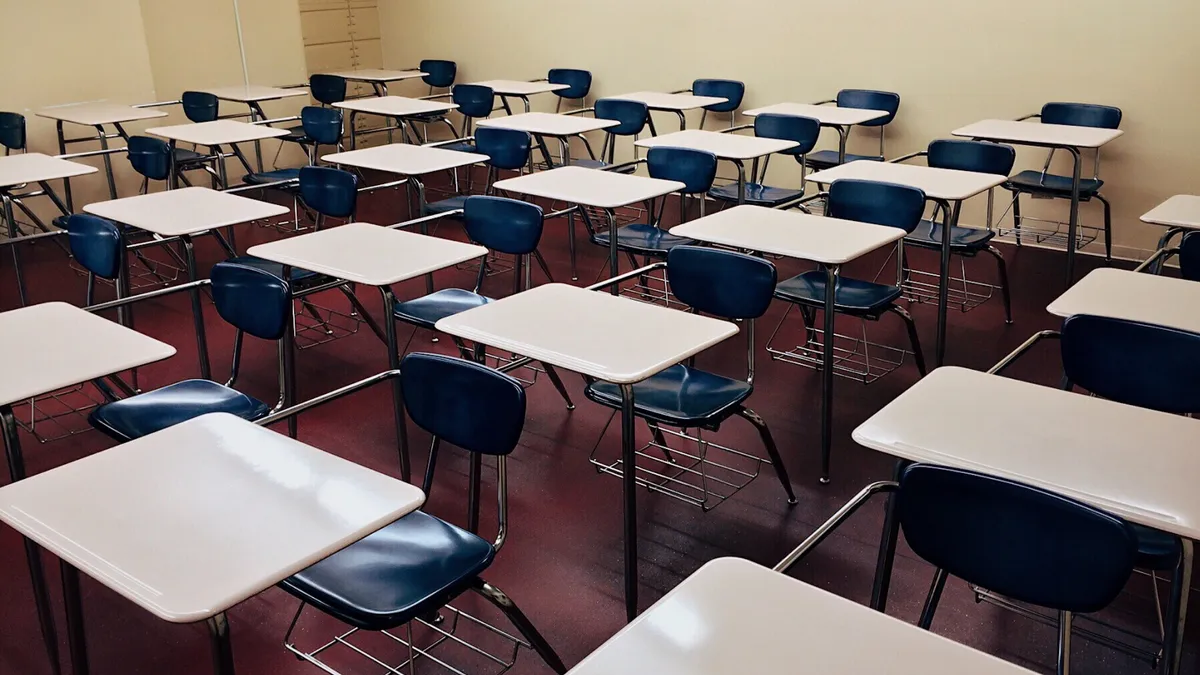Dive Brief:
- National surveys of 1,001 parents of public school K-12 students and 816 public school teachers — both conducted by Hart Research Associates for the American Federation of Teachers (AFT), Alliance to Reclaim Our Schools, League of United Latin American Citizens and NAACP — find both groups remain concerned about school reopenings amid the ongoing coronavirus pandemic.
- Perhaps most notably, the results show a third of teacher respondents reporting that the pandemic has made them more likely to exit the profession or opt for early retirement. Of those more likely to do so according to the surveys, 45% are over age 50, 44% have over 20 years experience and 42% live in the South.
- In addition, over half of parents and teachers believe the worst of the pandemic has passed but still consider it a serious problem, with around half of both groups reporting a member of their households have a condition putting them at high risk. Around 44% of parents and 42% of teachers also report knowing someone who has lost a job or had hours cut due to COVID-19.
Dive Insight:
This week, the U.S. Centers for Disease Control and Prevention issued a new indicator and risk threshold resource for making decisions on school reopenings. Among the tool's core indicators for reopenings are:
- The number of new cases per 100,000 people within the last 14 days.
- The percentage of positive tests within the last 14 days.
- A school's ability to implement five key COVID-19 transmission mitigation strategies.
The resource comes in the wake of a Center on Reinventing Public Education report that found 23 states and the District of Columbia failed to provide clear public health guidance to districts making reopening decisions. Around 85% of districts nationwide began the 2020-21 school year remotely, with many planning to transition to hybrid or full face-to-face models at later points in the academic year.
The CDC resource will help as these districts make that transition, and as others determine if they need to step back. An additionally important pulse for administrators to monitor will be how the transition back to brick-and-mortar impacts the concerns of the 60% of teachers and 54% of parents in the Hart Research Associates surveys who reported discomfort with starting the school year in-person.
Along with the budgetary impacts of the pandemic, districts are also contending with potential early retirements or exits from the profession that would compound pre-existing teacher shortages. According to the Kaiser Family Foundation, an estimated 24% of educators have a condition that puts them at higher risk in the event of a coronavirus infection.
"Our nation’s classrooms are a microcosm of what is occurring everywhere in our country during this pandemic, and we now know that even children are not immune in close proximity among themselves or with others," Sindy Benavides, CEO of LULAC, said in a release. "The only difference is that what we, as adults, decide to do is our choice, while students are being mandated, and by extension their teachers and school staff, to re-enter spaces that at present pose a risk of exposure to the virus."








 Dive Awards
Dive Awards





